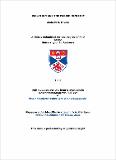Files in this item
Isolation and the parish ministry
Item metadata
| dc.contributor.advisor | Lyall, David | |
| dc.contributor.author | Irvine, Andrew R. | |
| dc.coverage.spatial | 500 | en_US |
| dc.date.accessioned | 2012-06-04T13:32:13Z | |
| dc.date.available | 2012-06-04T13:32:13Z | |
| dc.date.issued | 1989 | |
| dc.identifier | uk.bl.ethos.328167 | |
| dc.identifier.uri | https://hdl.handle.net/10023/2626 | |
| dc.description.abstract | The purpose of this thesis was to examine the concept of isolation as it occurs within the profession of ministry. Isolation, for the purpose of this thesis, is defined social-psychologically. Within the field research isolation is considered as evidenced professionally, socially and spiritually. This study utilized as its sample base 200 hundred Church of Scotland ministers (15% of total population) which provided 159 usable responses to an extensive mail survey. The mail survey consisted of a questionnaire designed and tested to measure experienced isolation; the Myers-Briggs Type Indicator, a personality measure; and the Purpose In Life Test, a measure of motivation. A further 15% of the respondents were selected by random process for direct interviews. The thesis is divided into four primary sections; psychological perspective, theological perspective , field research, summary and conclusions. Chapter 1 reviews eight psychological perceptions of isolation as found in the works of such notables as Freud, Adler, Fromm, Horney, Laing, Sullivan, and Frankl. From these it was determined that common to all perspectives of isolation was a primary isolation from the SELF. In chapters 2 and 3a model of isolation was developed from the work of C. G. Jung and applied to the profession of ministry. Chapters 4 to 6 examine the concept of separation from the self from a theological perspective as found in the works of P. Tillich and E. Brunner. Chapter 6 develops a composite view of the self and considers it in light of the redemptive process. Chapters 7 to 10 review the actual field study conducted by the researcher among the Church of Scotland ministers. This study concludes in Chapter 11 with a summary of the findings and their implications for the ministry of the church. The salient factor evidenced was that isolation is not primarily an inter-relational problem, but rather an intrarelational phenomenon. | en_US |
| dc.language.iso | en | en_US |
| dc.publisher | University of St Andrews | |
| dc.subject.lcc | BX9079.I8I8 | |
| dc.subject.lcsh | Patronage, Ecclesiastical--Scotland | en_US |
| dc.title | Isolation and the parish ministry | en_US |
| dc.type | Thesis | en_US |
| dc.type.qualificationlevel | Doctoral | en_US |
| dc.type.qualificationname | PhD Doctor of Philosophy | en_US |
| dc.publisher.institution | The University of St Andrews | en_US |
This item appears in the following Collection(s)
Items in the St Andrews Research Repository are protected by copyright, with all rights reserved, unless otherwise indicated.

